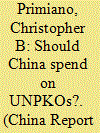| Srl | Item |
| 1 |
ID:
163123


|
|
|
|
|
| Summary/Abstract |
This article examines a particular data set on China's statements in the United Nations (UN) on human rights issues that has heretofore not received attention. As this data set is from the Chinese government's own selection, and not from the UN's repository, it reflects the Chinese government's position on human rights that it aims to advance. The author's review reveals that while the Chinese government strives to shield governments of developing countries with respect to human rights abuses, it has consistently criticised the governments of developed countries about human rights issues. To better understand China's strong support for developing countries, this article examines China's support for Myanmar, North Korea and Sri Lanka as case studies. The Chinese government has selectively—not consistently—opposed country-specific human rights criticism. Based on the prevailing pattern, the author addresses the implications for the future of global governance and of China's actions in international politics pertaining to human rights.
|
|
|
|
|
|
|
|
|
|
|
|
|
|
|
|
| 2 |
ID:
145145


|
|
|
|
|
| Summary/Abstract |
Given the tremendous amount of money that China has poured into events such as the 2008 Beijing Games and the 2010 Shanghai Expo and establishing Confucius Institutes throughout the world, the Chinese government is interested in advancing its international image and developing its soft power. In some instances, however, the Chinese government is willing to resist international pressure regarding human rights issues. In the process, the Chinese government is willing to incur damage to its international image on the issues in which it believes that there are more costs by adhering to international criticism than gains for China. In short, to what extent is China concerned about its international image regarding human rights pressure? Under what conditions is China willing to resist international criticism regarding human rights and thus incur damage to its international image?
|
|
|
|
|
|
|
|
|
|
|
|
|
|
|
|
| 3 |
ID:
162646


|
|
|
|
|
| Summary/Abstract |
In this article, I assess how states can use emotions as a strategic tool to advance their preferences in international politics. To test the argument in the literature on the significant role that emotions can play in international politics, I examine why China reacted the way it did to the 2008 torch relay fallout in France as a case study. Instead of material power playing a central role in this case, it was what the event (i.e., the torch relay, pro-Tibet protests, and the attempt to seize the torch out of the hands of a Chinese) represented in the minds of Chinese. This case study highlights the significant role that identity and emotions play in international politics.
|
|
|
|
|
|
|
|
|
|
|
|
|
|
|
|
| 4 |
ID:
163380


|
|
|
|
|
| Summary/Abstract |
When China joined the United Nations in 1971, it viewed UN peacekeeping operations (UNPKOs) as an instrument for powerful countries to exploit weaker countries. Today, under Xi Jinping, China contributes the largest number of UN peacekeeping personnel among the five permanent (P5) members of the UN Security Council. This article presents findings from a pilot study based on a survey conducted at two international universities in China in the fall of 2016, regarding how Chinese students perceive China’s UNPKO involvement. A total of 297 Chinese university students participated in this survey. Given that there has been little scholarship on how Chinese citizens view China’s UNPKO spending or involvement, this article aims to contribute to our understanding of this subject.
|
|
|
|
|
|
|
|
|
|
|
|
|
|
|
|
| 5 |
ID:
174884


|
|
|
|
|
| Summary/Abstract |
In recent years, many have said that democracy globally is being rolled back and that it is the source of much dissatisfaction. This article presents the findings from a survey of Kazakhstani university students on how they view democracy. The vast majority of participants view democracy as consisting of civil and political rights (i.e., the Western concept of democracy). However, also based on our survey results, our main argument is that, if forced to choose, they consider social services and economic development more important than political and civil rights. Another finding is that Muslims demonstrate stronger support for democracy than non-Muslims.
|
|
|
|
|
|
|
|
|
|
|
|
|
|
|
|